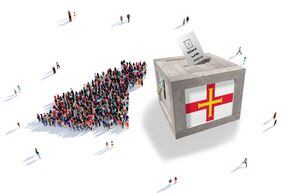Lack of IWV interest ‘disappointing’
A SHORTAGE of people applying to represent island-wide voting options is ‘slightly disappointing and surprising’, the States’ Assembly & Constitution Committee president has admitted.

However, Peter Roffey felt it was not necessarily indicative of a lack of interest in the referendum that will take place in October.
The deadline for applications closed at noon yesterday, with only three groups coming forward, all in the final 24 hours.
Deputies Carl Meerveld and Peter Ferbrache have applied to campaign for option A, deputies all elected in one go on an island-wide basis.
Fergus Dunlop and Caroline McManus have applied to represent the status quo [option B], while Deputy John Gollop and former deputy Rhoderick Matthews want to campaign in favour of a combination of island-wide and district voting [option C].
Nobody has come forward to represent Options D or E, which are for four electoral districts and staggered elections on an island-wide basis respectively.
Deputy Roffey said the campaign groups had an ‘essential part to play’ in the referendum process.
‘We feel people can explain to the public why their option is a good idea better than we can, as we have to take a neutral stance.’
‘It [the number of applications] is a slight disappointment.
‘To be fair to us we have gone the extra mile to promote it, so there are no excuses. You can lead a horse to water but you cannot make it drink.’
Deputy Roffey said it was particularly surprising that only one group had applied to represent full island-wide voting, given the number of people who have expressed an interest in electoral reform.
He said it was too early to say whether this was indicative of the level of public interest in the referendum.
The results of the referendum will be binding only if 40% of people on the electoral roll vote in it.
‘I don’t know how big the turnout will be, my job is to make sure islanders are kept informed and that no one is in any doubt that the referendum is taking place and what their votes mean,’ he added.
The applications have been passed to the independent assessment panel for their consideration.
The role of the panel is to review the applications and decide whether each group is capable of publicising and representing the option they wish to promote.
The successful groups will be eligible for a grant of up to £5,000 from the States to publicise their favoured options.
Total referendum expenses must not exceed £10,000 by law.
It is likely that referendum staff will have to explain the unrepresented options in a neutral way at any hustings that are held ahead of the referendum.
